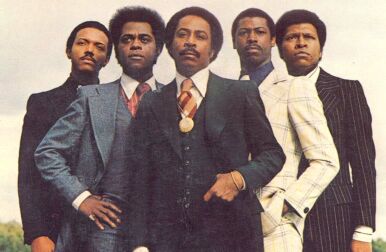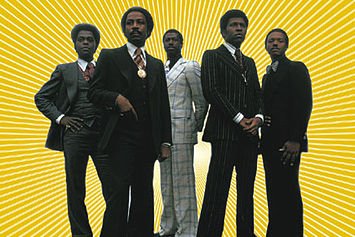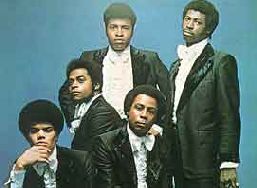HAROLD MELVIN & THE BLUE NOTES / “I Miss You”
Things ain’t what they used to be, and moreover, they never were. Life is always changing. Once the twentieth century arrived, technology massively changed lifestyles globally—think of it: electricity, radio, television, atomic power/bomb, computers, cell phones/mp3 players, internet. All preceding centuries cantered along at a leisurely pace compared to the last hundred years or so. Survival and lifestyle paradigm shifts now occur two or three times in a human lifetime rather than once in a century or so.
The connection to music is not so obvious at first glance but again think about it: the music we know as black music is contiguous with the invention and development of commercial sound recording. BoL was not possible even twenty years ago—now from anywhere in the world you can instantly access and read about, listen to and look at photographs related to the music.
What also has happened is the destruction of the canon, an establishment sanctioned “best of” list. Rather than a select grouping, we can now enjoy a broad sweep of the music at will, literally holding in our hands more music than is contained in the average municipal library.
But we are still humans and the music that matters most to me is the music that reflects our humanity, whether it’s a struggles for survival and freedom, or a focus on relationships and/or spirituality. These are the themes that resonate most with yours truly and through the use of technology I can enjoy an unprecedented diversity of hip music.
 Which all brings me to Harold Melvin and The Blue Notes. Last week we did Norman Connors, a few weeks back the focus was on Billy Paul, this week the group that launched former drummer Teddy Pendergrass. I guess it’s obvious we’ve crossed the Philadelphia city limits line.
I generally think of this music as “sophisticated soul.” The musicianship and production values were more urbane than Motown and also more overtly political. Motown overtly attempted to be the sound of "young America," which implicitly meant appealing to white teenagers. Philly Soul never pretended it was designed to crossover. The primary audience for Philly Soul was seventies and eighties black folk, newly moving up toward middle class lifestyles: professional jobs above minimum wage, college education, and elevated social aspirations.
Listen to these songs. The double focus on social issues and personal relationships is the hallmark of Philly Soul. It is significant that Harold Melvin and The Blue Notes were not the preeminent group of their era and there are certainly a number of more famous songs not only from the era but also from the Philly Soul family but my point is that the times were so sweet even the less famous were producing fabulous music.
In 1954, or thereabouts, Harold Melvin changed the name of his group The Charlemagnes to The Blue Notes. Melvin was determined to make it and kept tinkering with his soul until he produced a hit. Over the years group members would come and go, including Teddy Pendergrass who as a solo artist eclipsed Harold Melvin and The Blues Notes. At one point the hot rumor is that Teddy tried to change the name of the group to Teddy Pendergrass and The Blue Notes—we can imagine how far that went. Another shift was the addition of Sharon Paige, the only female member in the long history of the group.
During the mid-seventies Harold Melvin and The Blue Notes were hot as both recording artists and concert performers. Their success is a testament to both the leadership abilities and the determination of Harold Melvin. Born in Philadelphia in 1939, Harold Melvin died in 1997.
Which all brings me to Harold Melvin and The Blue Notes. Last week we did Norman Connors, a few weeks back the focus was on Billy Paul, this week the group that launched former drummer Teddy Pendergrass. I guess it’s obvious we’ve crossed the Philadelphia city limits line.
I generally think of this music as “sophisticated soul.” The musicianship and production values were more urbane than Motown and also more overtly political. Motown overtly attempted to be the sound of "young America," which implicitly meant appealing to white teenagers. Philly Soul never pretended it was designed to crossover. The primary audience for Philly Soul was seventies and eighties black folk, newly moving up toward middle class lifestyles: professional jobs above minimum wage, college education, and elevated social aspirations.
Listen to these songs. The double focus on social issues and personal relationships is the hallmark of Philly Soul. It is significant that Harold Melvin and The Blue Notes were not the preeminent group of their era and there are certainly a number of more famous songs not only from the era but also from the Philly Soul family but my point is that the times were so sweet even the less famous were producing fabulous music.
In 1954, or thereabouts, Harold Melvin changed the name of his group The Charlemagnes to The Blue Notes. Melvin was determined to make it and kept tinkering with his soul until he produced a hit. Over the years group members would come and go, including Teddy Pendergrass who as a solo artist eclipsed Harold Melvin and The Blues Notes. At one point the hot rumor is that Teddy tried to change the name of the group to Teddy Pendergrass and The Blue Notes—we can imagine how far that went. Another shift was the addition of Sharon Paige, the only female member in the long history of the group.
During the mid-seventies Harold Melvin and The Blue Notes were hot as both recording artists and concert performers. Their success is a testament to both the leadership abilities and the determination of Harold Melvin. Born in Philadelphia in 1939, Harold Melvin died in 1997.
 If you have ears, hips, feet, a libido, memories of love discovered / love lost, and any degree of social awareness whatsoever, then these songs will strike a responsive chord. Isn’t it wonderful to hear both romance and social concerns intimately entwined?
From the critical call of “Wake Up Everybody” and the hard critique of “Be For Real” (“if you’re gonna boast, boast around somebody who has what you have / don’t make your own brothers and sisters feel bad”), from those insightful reminders to never forget one’s origins to the ultimate begging song, “I Miss You,” and the expression of optimism following a breakup, “Hope That We Can Be Together Soon,” this is music that is a direct soundtrack for the day-to-day ups and downs we go through both as a people and as individuals.
If you have ears, hips, feet, a libido, memories of love discovered / love lost, and any degree of social awareness whatsoever, then these songs will strike a responsive chord. Isn’t it wonderful to hear both romance and social concerns intimately entwined?
From the critical call of “Wake Up Everybody” and the hard critique of “Be For Real” (“if you’re gonna boast, boast around somebody who has what you have / don’t make your own brothers and sisters feel bad”), from those insightful reminders to never forget one’s origins to the ultimate begging song, “I Miss You,” and the expression of optimism following a breakup, “Hope That We Can Be Together Soon,” this is music that is a direct soundtrack for the day-to-day ups and downs we go through both as a people and as individuals.
 I also like the strong blues and gospel retentions in their sound—the preaching, screaming and hollering, raw and urgent even as the strings soar in the background. Without a doubt they rehearsed but there is the freshness of improvisation surging all through the tracks. The solos are inspired outpourings that make us feel good as we listen and smile and pat our foot or nod our head.
Even with the disco movement shaping some of their sounds, Harold Melvin and The Blue Notes retained a realness and relevancy that enables the music to remain on point thirty and forty years after the initial issuing of the recordings. I guarantee that there is at least one song in this set that will touch you in an intimate way. I mean not just a sentiment you agree with but rather a lyric that addresses your personal experiences as though the guys had been in your living room or your bedroom and made a record of what they heard and saw.
Everyone at some one time or the other has missed someone; each of us has also (thankfully) had someone enter our life who made us feel good. These are songs to both commemorate those missing and to celebrate those who touched us.
“We all got our own funny moods…” Serious music for the funny moods of each of us. Yes, great goodness of life, yes. Classic Harold Melvin and The Blue Notes.
—Kalamu ya Salaam
Every song except "Be For Real" is available on Greatest Hits. "Be For Real" is available on Wake Up Everybody: 15 Greatest Hits, which contains all the songs in this set except "I Miss You"—c'est la vie, you have to buy two compilations to get all eight songs in our Harold Melvin and The Blue Notes set.
I also like the strong blues and gospel retentions in their sound—the preaching, screaming and hollering, raw and urgent even as the strings soar in the background. Without a doubt they rehearsed but there is the freshness of improvisation surging all through the tracks. The solos are inspired outpourings that make us feel good as we listen and smile and pat our foot or nod our head.
Even with the disco movement shaping some of their sounds, Harold Melvin and The Blue Notes retained a realness and relevancy that enables the music to remain on point thirty and forty years after the initial issuing of the recordings. I guarantee that there is at least one song in this set that will touch you in an intimate way. I mean not just a sentiment you agree with but rather a lyric that addresses your personal experiences as though the guys had been in your living room or your bedroom and made a record of what they heard and saw.
Everyone at some one time or the other has missed someone; each of us has also (thankfully) had someone enter our life who made us feel good. These are songs to both commemorate those missing and to celebrate those who touched us.
“We all got our own funny moods…” Serious music for the funny moods of each of us. Yes, great goodness of life, yes. Classic Harold Melvin and The Blue Notes.
—Kalamu ya Salaam
Every song except "Be For Real" is available on Greatest Hits. "Be For Real" is available on Wake Up Everybody: 15 Greatest Hits, which contains all the songs in this set except "I Miss You"—c'est la vie, you have to buy two compilations to get all eight songs in our Harold Melvin and The Blue Notes set.
This entry was posted on Monday, December 22nd, 2008 at 1:00 am and is filed under Classic. You can follow any responses to this entry through the RSS 2.0 feed. You can leave a response, or trackback from your own site.
2 Responses to “HAROLD MELVIN & THE BLUE NOTES / “I Miss You””
December 22nd, 2008 at 11:14 pm
How quickly we forget: The songs by mostly all of Philadelphia International artists were from the pen from the founders of the label: Kenneth Gamble & Leon Huff. McFadden & Whitehead, Bunny Siegler, and Dexter Wansel were also writers. It wasn’t until the end of the decade where some of the artists submitted songs. Arrangements were mostly done by Bobby Martin or other band members of MFSB.
January 13th, 2009 at 2:30 pm
Harold Melvin and the Blue Notes
Cool Post! Harold Melvin and the Blue Notes is my passion! Thank you! Keep up the good work. Best regards. Art. Tuesday
Leave a Reply
| top |